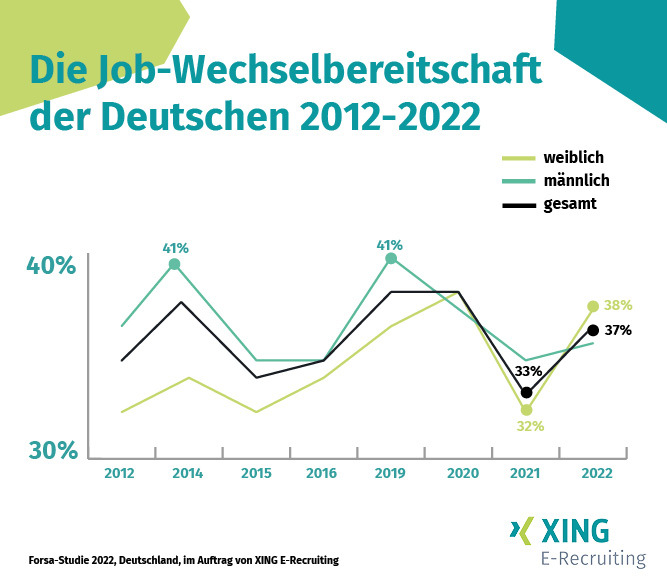The pandemic has shown many workers what is wrong with their job. So many people are looking for a new job. They attach particular importance to corporate culture rather than salary.
In the course of the pandemic, the willingness of employees to change jobs in Germany has increased. This is shown by a study by XING E-Recruiting in cooperation with forsa. This survey has been conducted since 2012, with the focus on employee satisfaction and reasons for changing jobs. This year, the results show how important the corporate culture is to employees.
Termination without a new job
According to the study, 37 percent of those surveyed are open to a new job or have already taken action in this regard. In 2021 it was still 33 percent. The desire to change jobs is particularly high in the 30 to 39 age group: 48 percent are longing for a new job. Ten percent have already changed jobs since the pandemic began, with a quarter confirming that the decision was influenced by the corona situation. It is also particularly interesting that 25 percent have already given notice without having a new job in prospect.
The reason for this is probably that the pandemic made those affected aware of what was going wrong at their current job and they no longer wanted to expose themselves to it – even if a new employment contract had not yet been signed. In addition, it is mainly women who want to change careers. 38 percent of them are looking for a new job in 2022.
–
Corporate culture is more important than salary
When looking at the results, it is important to note that there is a difference between the reasons respondents think about changing jobs and the reasons that actually lead to the change. In the first category, the money makes employees think: 42 percent hope for a higher salary from a new job, and among those under 29 the figure is even 72 percent. In addition, 38 percent are dissatisfied with the current management and their direct superiors (30 percent). Further mind games are triggered by the desire for a new area of activity (31 percent) and the search for a meaningful work (26 percent).
The triggers for an actual job change look a little different. Those who have actually changed jobs do so mainly because of problems with company management (28 percent), an unbalanced work-life balance (27 percent) and dissatisfaction with their current job (24 percent). Financial incentives are only an actual trigger for the change for 19 percent. This shows how important the corporate culture and cooperation are to employees – especially between employees and management.

–
Since the beginning of the pandemic, there has also been a change in what makes employers attractive today. Good management behavior is important to 59 percent of those surveyed, 57 percent see flexible working hours as a plus and 54 percent expect a fair salary. In addition, 52 percent each consider meaningfulness at work and remote work to be important.
Salary is still an important factor when deciding on a new job – but it’s no longer the most important one. Employees increasingly long for a good working environment in which management is empathetic and flexible and also takes care of the work-life balance of the employees. Companies should take these study results to heart and critically reflect on their management style in order to be able to continue fighting the war for talent.
–


